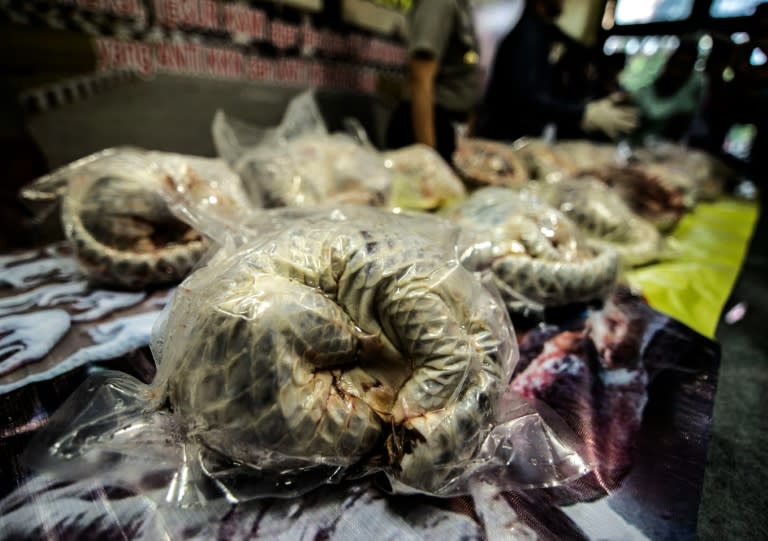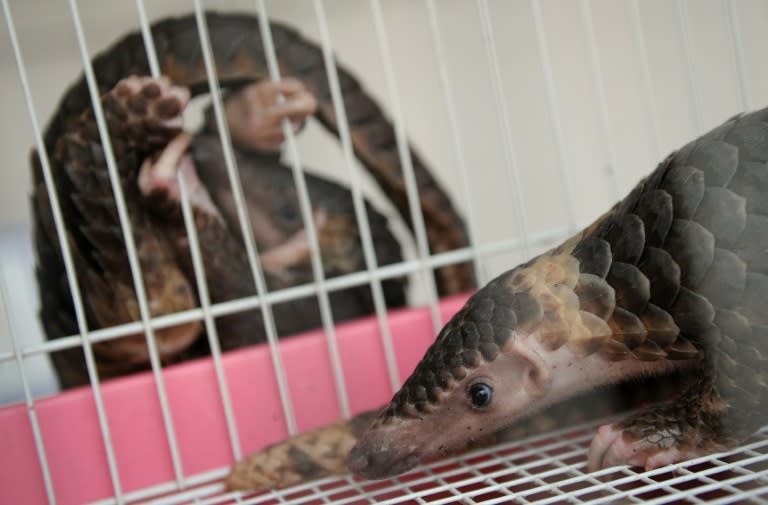Shy pangolins need world spotlight to survive
Reclusive, gentle and quick to roll up into a ball, pangolins keep a low profile. But they are also the world's most heavily trafficked mammal, and experts at the Convention on International Trade in Endangered Species (CITES) conference this week are ringing alarm bells over their survival. Demand for pangolin meat and body parts has fuelled a bloodbath, and driven the scale-covered, ant-eating mammal towards extinction. More than a million pangolins are believed to have been poached from the wild in the past decade. Most are used to supply demand in China and Vietnam, where they are highly regarded as a delicacy and an ingredient in traditional medicine. At the CITES meeting in Johannesburg, conservationists will discuss moving pangolins into the highest protection category, which bans all international trade. "The pangolin today is regarded as the most heavily trafficked mammal in the world," CITES chief John Scanlon told AFP. "There has been a massive surge in the illegal take of the pangolin for its meat and for its scales." Currently CITES allows for trade in pangolins but under strict conditions. "Existing laws are clearly failing to protect pangolins from the poachers. A complete international trade ban is needed now," said Heather Sohl, WWF-UK's wildlife advisor. There are four species of pangolin in Africa and four in Asia. Watchdogs say those in Asia are being eaten to extinction, while populations in Africa are declining fast. Research published in the early 2000s estimated populations in China to have declined by up to 94 percent, said Dan Challender, pangolin expert at the International Union for Conservation of Nature. - Curl into a ball - Pangolins are covered in overlapping scales, and have pink, sticky tongues almost as long as their bodies. When physically threatened, they curl into ball, making it easy for them to be picked up by hunters and put into a sack. About the size of a small dog, they are solitary, mostly nocturnal and cannot be farmed. "Pangolins are notoriously difficult to keep in captivity -- they only feed on wild ants and termites, and they are extremely prone to stress and dehydration, so they die," Ray Jansen, of the African Pangolin Working Group, told AFP. In Chinese traditional medicine, pangolin scales are ground into a powder believed to cure conditions from headaches and menstrual cramps to nose bleeding and lack of virility. The scales are sometimes even used as guitar plectrums. In traditional African culture, some people believe in keeping a scale in their pockets to ward off evil. Zimbabweans used to present the mammals to President Robert Mugabe during his early years in office, but the practice has been discontinued. "In Shona and Zulu culture, a pangolin is regarded as the greatest gift you can bestow on a chief, statesman or an elder," said Jansen. Pangolin fat, blood and bones are also highly valued in African traditional medicine. According to Jansen, in South Africa a pangolin can sell for anything between 10,000 rand ($730) to 80,000 rand ($5,800) depending on the client. India, the Philippines, Vietnam, Nigeria, Senegal and the United States are co-sponsoring the proposal to impose a total ban on pangolin trade. The CITES treaty, signed by 182 countries and the European Union, protects about 5,600 animal and 30,000 plant species from over-exploitation through commercial trade. The 12-day conference started Saturday and will sift through 62 proposals to tighten or loosen trade restrictions on some 500 species.




